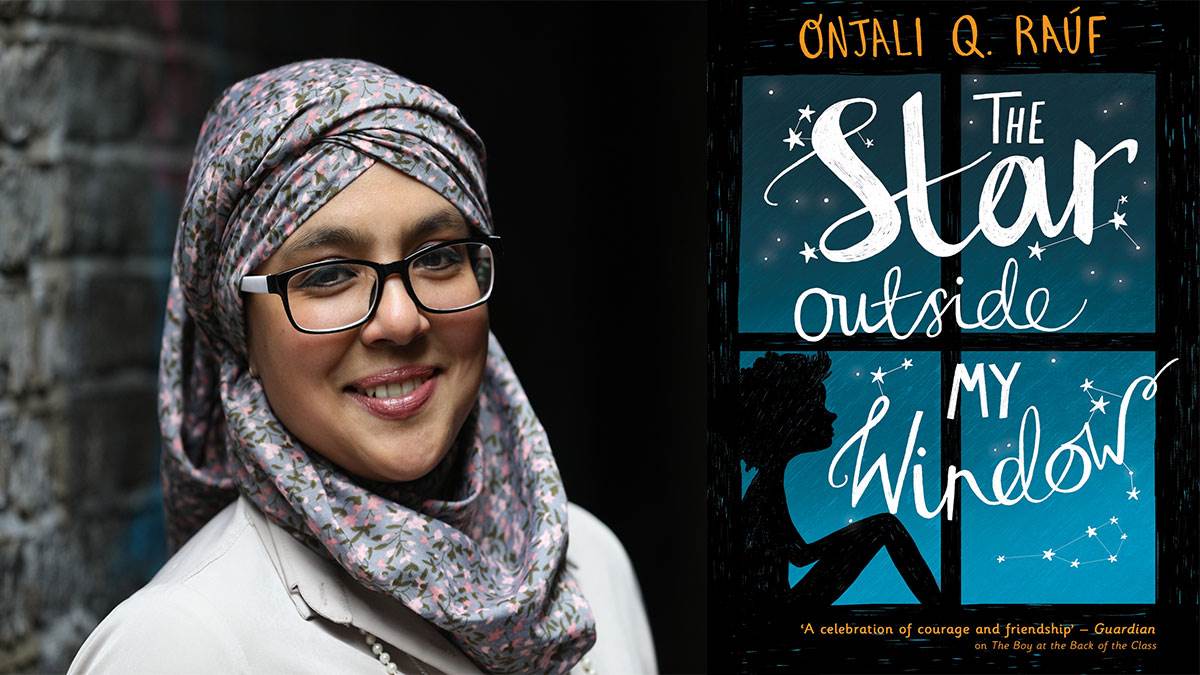Defeating our demons: Writing difficult stories for our little ones
Published on: 2 Gorffennaf 2019 Author: Onjali Rauf
Onjali Rauf was wondering why she found her second children's book so tricky to write. Then she realised that it was down to the subject matter – and this made it even more important to keep going and explore something so difficult and delicate.
 Author Onjali Rauf and her book The Star Outside My Window
Author Onjali Rauf and her book The Star Outside My Window
Over this past year, I have been battling with a Balrog-sized literary demon that goes beyond the two words all would-be authors fear the most: the dreaded "Writer’s Block".
After all, someone with Writer’s Block is simply deemed as being temporarily stuck – they don’t know how to proceed, can’t find the words to articulate their story and so spend days and months, and maybe even years, trying to get out of that solitary dark dungeon in whichever way they can.
But for me, my battle has superseded those two words to forge what I can only describe as an all-out stampede of crippling fears which have rendered my inner story-voice mute. Not because I don’t know the story I want to tell, or don’t have the words to tell it with. In fact, in direct opposition to Writer’s Block, I have too many words tumbling out of me (as my poor editor knows!), and too many stories trying to squeeze themselves out.
But for months on end, and in defiance of looming deadlines, the story I wanted to tell refused to come out into the light, and seemed only able to present itself to me with a big fat mask on, disguised as a completely different story than the one I was striving for. So for most of this past year, I have written endless chapters featuring the wrong characters with the wrong voices going on the wrong adventures. And it was all because of one overriding feeling: Fear with a massive capital "F": word-stopping, mind-stopping, all-out, fire-breathing, Fear.
Reality of domestic violence
Following the beautiful reception of The Boy at the Back of the Class by both children and adults alike over this past year, perhaps it was natural for me to be afraid to put fingertips to keypad again so soon. But whilst I’m constantly comforted by the fact that "Second Book Syndrome" is an actual thing (who knew!?), I also knew that my fears had nothing to do with worries that a second book baby might not do as well as my first. It took me a long while to figure it out and admit it, but I finally understood that my sudden cry for writing crutches was rooted in the subject matter: one that lies perhaps a little too close to my heart.
Domestic violence ending in homicide is not a topic most children’s publishers will touch with a missile projector, let alone a bargepole. Despite the fact that at least one in seven of our children will have witnessed, or themselves be survivors of, some form of domestic violence. And with two women being murdered at the hands of a man every single week in the UK alone and leaving behind shattered families, friends and children, it’s a reality I know more children are aware of, or are living through, than we may perhaps like to admit.
But here I am, attempting to write about this very topic for children. Children that some may deem too young to know of such matters. Children that others will concede know too much about them.
Remembering wonder and hope
I can therefore say, without a shadow of doubt that The Star Outside My Window has been one of the most difficult stories I have ever written – or will ever write. Not because the story wasn’t there, but because to be honest, there is still a large part of me which wishes I didn’t have to be writing it at all. Talking to informed adults about this subject matter is difficult enough – but how do we speak to our children about something so heartbreaking without making them lose their capacity for wonder and hope and adventure?
It’s a question I think I’ll always be asking myself, but looking back out into the swirling galaxy of truly amazing children’s books that have littered my life, I have come to realise that my question is nothing new.
Every book I ever loved as a child deals with difficult matters in some way shape or form. From Hans Christian Anderson’s The Little Match Girl and Oscar Wilde’s The Happy Prince, to The Railway Children, Black Beauty, Anne of Green Gables, Charlotte’s Web, even Matilda and Danny, the Champion of the World, and today’s Harry Potter...
Children’s books have never shied away from dealing with social injustices, inequalities, death, grief and loss head on – subjects children are rarely ever spoken to about until after The Life-Changing and Irreversible Event has already happened in their lives. It’s comforting to know children’s books are at the forefront of speaking about the unspoken of – albeit in the land of the imagination.
And with that in mind, I’m going to push my Balrog out of the way, and write on...
Topics: 6-8 years, 9-11 years, 12+, Fear, Personal/social issues, Writing, Features






Add a comment